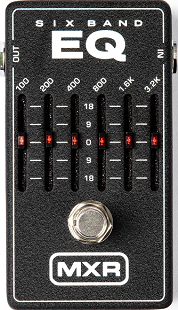Difference between revisions of "M109 6-band EQ"
(→Controls) |
|||
| Line 8: | Line 8: | ||
==Controls== | ==Controls== | ||
[[File:MXR_6BandEq_front.png|right|frame|<div style="text-align:right">Image from [https://www.jimdunlop.com/product/m109-7-10137-00657-7.do Jim Dunlop]</div>]] | [[File:MXR_6BandEq_front.png|right|frame|<div style="text-align:right">Image from [https://www.jimdunlop.com/product/m109-7-10137-00657-7.do Jim Dunlop]</div>]] | ||
| + | |||
| + | * Fader 1 - '''"100Hz"''': 100 Hertz. | ||
| + | * Fader 2 - '''"200Hz"''': 200 Hertz. | ||
| + | * Fader 3 - '''"400Hz"''': 400 Hertz. | ||
| + | * Fader 4 - '''"800Hz"''': 800 Hertz. This is just below where audio engineers and audiophiles describe "midrange" frequencies existing. | ||
| + | * Fader 5 - '''"1.6KHz"''': 1,600 Hertz. | ||
| + | * Fader 6 - '''"3.2KHz"''': 3,200 Hertz - upper midrange to treble frequency. | ||
| + | * Footswitch 1 - '''"On/Off"''': This switch toggles between active or engaged ("On") and bypassed ("Off"). | ||
| + | |||
| + | Note that between the volume and lowest frequency faders on the left, the faders in the middle of the pedal, and between the highest frequency and gain faders on the right, MXR has labelled the enclosure with a painted indicator showing +12 dB to -12dB in the span of the faders. | ||
| + | |||
| + | Setting the fader for a particular frequency at "0" (zero) means that that frequency is being neither boosted nor attenuated. An M108 with all faders at "0" should have the same volume level and therefore sound the same on as off. This is called "Unity Gain". Moving the fader of a selected frequency up increases the volume of that frequency in the output signal; likewise, sliding that same fader below "0" reduces the volume of that same frequency. | ||
| + | |||
| + | It's also useful to note the separate '''Volume''' and '''Gain''' faders on each side of the pedal. If many or most of the frequency faders are at zero or below, the total signal level coming out of the pedal may be below the original unity volume level. In such cases, it's advisable to boost the volume or gain so as to ensure "[[unity gain]]" when turning the pedal off and on. | ||
==Bypass:Unknown== | ==Bypass:Unknown== | ||
Revision as of 10:27, 17 April 2019
We put background information here
- Thermionic Studios has one (1) M109 6-Band EQ available for rental
Controls

- Fader 1 - "100Hz": 100 Hertz.
- Fader 2 - "200Hz": 200 Hertz.
- Fader 3 - "400Hz": 400 Hertz.
- Fader 4 - "800Hz": 800 Hertz. This is just below where audio engineers and audiophiles describe "midrange" frequencies existing.
- Fader 5 - "1.6KHz": 1,600 Hertz.
- Fader 6 - "3.2KHz": 3,200 Hertz - upper midrange to treble frequency.
- Footswitch 1 - "On/Off": This switch toggles between active or engaged ("On") and bypassed ("Off").
Note that between the volume and lowest frequency faders on the left, the faders in the middle of the pedal, and between the highest frequency and gain faders on the right, MXR has labelled the enclosure with a painted indicator showing +12 dB to -12dB in the span of the faders.
Setting the fader for a particular frequency at "0" (zero) means that that frequency is being neither boosted nor attenuated. An M108 with all faders at "0" should have the same volume level and therefore sound the same on as off. This is called "Unity Gain". Moving the fader of a selected frequency up increases the volume of that frequency in the output signal; likewise, sliding that same fader below "0" reduces the volume of that same frequency.
It's also useful to note the separate Volume and Gain faders on each side of the pedal. If many or most of the frequency faders are at zero or below, the total signal level coming out of the pedal may be below the original unity volume level. In such cases, it's advisable to boost the volume or gain so as to ensure "unity gain" when turning the pedal off and on.
Bypass:Unknown
General Information
https://www.youtube.com/watch?v=5xrBGitOIc4
Pedal Manual
Phase Inversion
Schematic
Artists
We are currently unaware of any artists actively using the pedal now, or who have in the past.
- Additional Sources